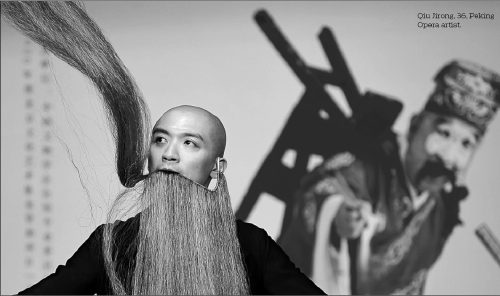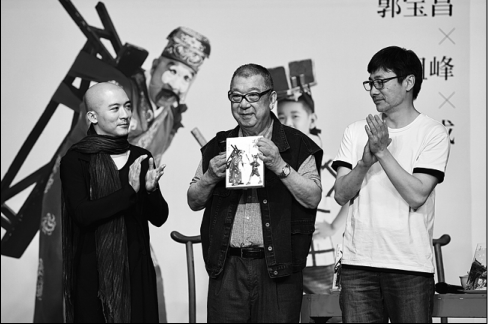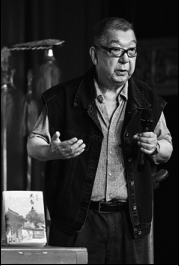OLD ART, NEW LIFE
Veteran film director Guo Baochang spotlights Peking Opera in a co-authored book, Chen Nan reports.

A photo on the cover of a new book written by Guo Baochang, a veteran film director, shows a smiley boy in T-shirt and jean shorts, with a small toy chair on his head, facing an old man, who has a wooden chair on his back. Both have paper fans. The old man is in Peking Opera makeup and costume and they seem to be playing a game.
After the book, The Marvelous Game, was published, Guo, a Peking Opera enthusiast, appeared at an old theater in Beijing to share his stories of the art form on July 2.
"It's been my longtime wish to write a book on Peking Opera, which I have loved since I was a little boy. The boy on the book cover is my grandson and I am playing a game with him by dressing up in a role from the classic Peking Opera piece, Shuang Bei Deng (Two Men Carrying Chairs)," says Guo, adding that it is a comedy, which tells the story of two "henpecked husbands" meeting up on the street and discussing their stories. "I hope that young people like my grandson will get to know more about Peking Opera and fall in love with it."
Tao Qingmei, a traditional arts scholar at the Chinese Academy of Social Sciences, co-wrote the book with Guo.
"We started to write the book in 2016. It took us years because Peking Opera is a sophisticated art form and we wanted to make the book easy and fun for everyone," says Guo.
Jingju, also known as Peking Opera, is a 200-year-old art form that combines singing, dancing, acrobatics and martial arts. In 1790, when four Hui Opera troupes visited Beijing as part of celebrations for the 80th birthday of Emperor Qianlong (1711-99), they stayed in the south of the city. Hui Opera, or huiju, is a form of Peking Opera from Anhui province.
In about 1840, Peking Opera began to formally take shape, growing rapidly during the reign of Empress Dowager Cixi (1835-1908), a patron of the art form. After this, Peking Opera went from strength to strength, with troupes formed in Beijing, Tianjin and Shanghai.
In 2010, it was declared an intangible cultural heritage of humanity by UNESCO.
Like many traditional art forms, Peking Opera is challenged by contemporary entertainment today and is losing its audience, especially among younger generations.
"I have read many books on Peking Opera, however, they talk about the art form from the view of an academic system, with the techniques and aesthetics being boring. For people, who may have never watched a Peking Opera show, it's hard to understand the art form," says Guo.
"I want to talk about the art form by sharing my own stories of learning, enjoying and displaying it as a film director."
Born in Beijing in 1940, Guo graduated from the Beijing Film Academy as a director and scriptwriter. In 1980, he made his directorial debut with the movie Mist Over Fairy Peak.
In 2001, Guo directed Da Zhai Men (Grand Mansion Gate), a 72-episode TV drama, based on the story of his adoptive father, which became one of the director's most well-known works. Considered a classic with a star-studded cast, including Chinese filmmakers Zhang Yimou, Chen Kaige and Jiang Wen, the TV drama is the story of the Beijing-based Bai family set during one of the most tumultuous periods in Chinese history, spanning from the late Qing Dynasty (1644-1911) up until World War II.
Peking Opera was used in the TV drama as the leading character, Bai Jingqi, is shown to be a fan of the art form. In 2017, it was adapted by Li Zhuoqun, a 30-year-old director and scriptwriter, into a Peking Opera piece of the same name, and toured nationwide.
Guo, 80, started to learn Peking Opera along with martial arts at the age of 5. He recalls watching Peking Opera pieces on the Monkey King and skipped school to watch shows. Performing and watching Peking Opera have been a major part of Guo's life.
In his book, Guo writes about the various elements of Peking Opera such as the paper fan, which is used by different roles and has various functions.
"One of the greatest things about Peking Opera is the simplicity of stage sets and props, which have many meanings," says Guo. "The paper fan, for example, can portray female roles' gracefulness or express their wits in male roles.
In the new book, he talks about the evolution of Peking Opera, and the roles and relationship between audiences and artists. Comparing movies, TV and Peking Opera, Guo says Peking Opera highlights the actor or actress while the other two arts center on the characters portrayed.
"When a fan of Peking Opera comes to watch a Peking Opera show, he or she hopes to see stars. Great Peking Opera masters such as Mei Lanfang, developed their own performing styles, which can be called legacy by their students and fans," says Guo, adding that today few Peking Opera artists can be called masters since they are not able to establish their own performing styles.
Guo also talks of his concern about the decline of the art form. In his book, he says that even his son, who has been educated in the United States and works with a foreign company in Beijing, didn't want to watch a Peking Opera performance.
"It was not until he watched a Peking Opera show along with a foreign friend that he was captivated by the old art form," says Guo.
He praises a Peking Opera artist from the newer generations: Qiu Jirong, whose grandfather, Qiu Shengrong (1915-71), was one of the best-known Peking Opera artists and developed a new performance style known as the "Qiu school". Qiu Jirong started learning Peking Opera skills at age 9. He graduated from the National Academy of Chinese Theater Arts and became a Peking Opera actor.
Qiu Jirong has also tried to adapt to modern art forms. He learned contemporary dance and has performed in crossover projects, such as the dance production Under Siege by dancer-choreographer Yang Liping and 2047 Apologue, a concept stage show directed by the renowned filmmaker Zhang Yimou. "He (Qiu Jirong) has absorbed various influences from different art forms, which has broadened his vision as an artist and enabled him to look at Peking Opera from a fresh perspective," Guo says.
On Dec 31, streaming site Bilibili broadcast its 4.5 hour gala, featuring a star-studded cast that included pianist Lang Lang, rock singer-songwriter Cui Jian and rock band Mayday. The gala was viewed 120 million times within 48 hours. A 9-minute Peking Opera show by Qiu Jirong and other artists also received warm feedback for giving the traditional art form a contemporary touch.
The performance, titled Jing Hong (The Elegance of Traditional Opera), was set in Qiu Jirong's dreams, where he combined contemporary dance and classic pieces from six Chinese art forms: Peking Opera, Kunqu Opera, Qinqiang Opera, Pingju Opera, Chuanju Opera and Hebei Bangzi.
"I was called rebellious since I broke my family's tradition of being a Peking Opera actor. Though I have never met my grandfather, he has been with me since I was born. Everyone told me to be a great artist like him," says Qiu Jirong, 36, who attended Guo's book event in Beijing. "I respect my family's artistic tradition very much. However, I don't want to simply imitate my grandfather. I want to create my own art."



Today's Top News
- Tesla overtaken by BYD in global EV sales in 2025
- Trade-in subsidy aims to drive more consumption
- Cooperation can boost cross-Strait integration
- State-owned firms register stable performance
- Global experts hail Xi's people-centered message
- Trips promote equality and coexistence






























